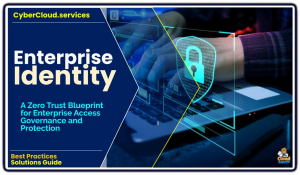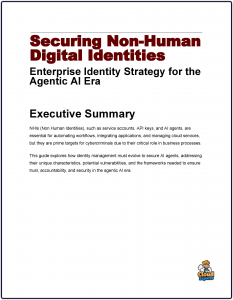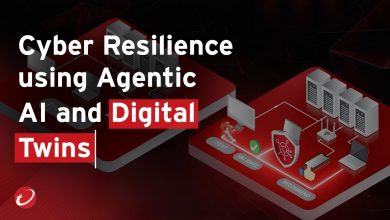 In this Microsoft article Tal Guetta discusses the growing importance of non-human identities (NHIs) in modern cybersecurity due to the rise of cloud applications and AI, which have increased machine-to-machine access and authentication.
In this Microsoft article Tal Guetta discusses the growing importance of non-human identities (NHIs) in modern cybersecurity due to the rise of cloud applications and AI, which have increased machine-to-machine access and authentication.
NHIs, such as service accounts, API keys, and AI agents, are essential for automating workflows, integrating applications, and managing cloud services, but they are prime targets for cybercriminals due to their critical role in business processes.
Tal highlights the challenges of securing NHIs, including their vast numbers, lack of human oversight, and potential for misconfiguration. It emphasizes the need for robust identity security strategies, including privileged identity management and just-in-time access, to mitigate risks.
Microsoft’s solutions, like Entra Agent ID and Defender for Identity, are presented as tools to enhance NHI protection by detecting suspicious activities and enforcing least privilege.
Securing AI: How Identity Management Will Evolve in the Agentic AI Era
Agentic AI fundamentally differs from traditional AI models. Where earlier systems operated within rigid parameters, agentic AI exhibits adaptability, reasoning, and decision-making capabilities that rival human autonomy. Consider an AI agent managing a global logistics network: it evaluates supplier bids, adjusts routes in real-time based on weather data, and ensures compliance with international trade regulations—all without human intervention.
Or envision a personal AI assistant that not only schedules meetings but also negotiates terms with vendors and safeguards sensitive data across jurisdictions. These scenarios, once speculative, are now within reach, driven by advancements in machine learning, natural language processing, and decentralized computing.
Yet, the very autonomy that empowers these agents also complicates their integration into secure, trusted systems. Unlike humans or devices, AI agents occupy a liminal space, requiring identities that are neither wholly human nor purely mechanical but uniquely suited to their dynamic roles.
Identity management, the cornerstone of digital security, must evolve to address the complexities of agentic AI. Traditional identity systems, designed for authenticating users through passwords, biometrics, or certificates, falter when applied to autonomous entities.
The evolution of identity management for AI agents hinges on several transformative approaches. Decentralized identity systems, rooted in self-sovereign identity (SSI) principles, offer a promising foundation. By leveraging distributed ledgers like blockchains, SSI enables agents to hold and manage their own cryptographic credentials, fostering autonomy and interoperability.
[box type=”download” align=”” class=”” width=””]
 Solution Guide – Securing Non Human Identities
Solution Guide – Securing Non Human Identities
NHIs (Non Human Identities), such as service accounts, API keys, and AI agents, are essential for automating workflows, integrating applications, and managing cloud services, but they are prime targets for cybercriminals due to their critical role in business processes.
This guide explores how identity management must evolve to secure AI agents, addressing their unique characteristics, potential vulnerabilities, and the frameworks needed to ensure trust, accountability, and security in the agentic AI era
[/box]



